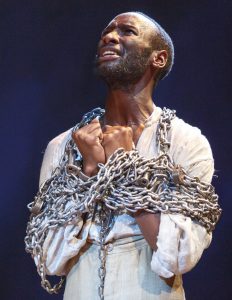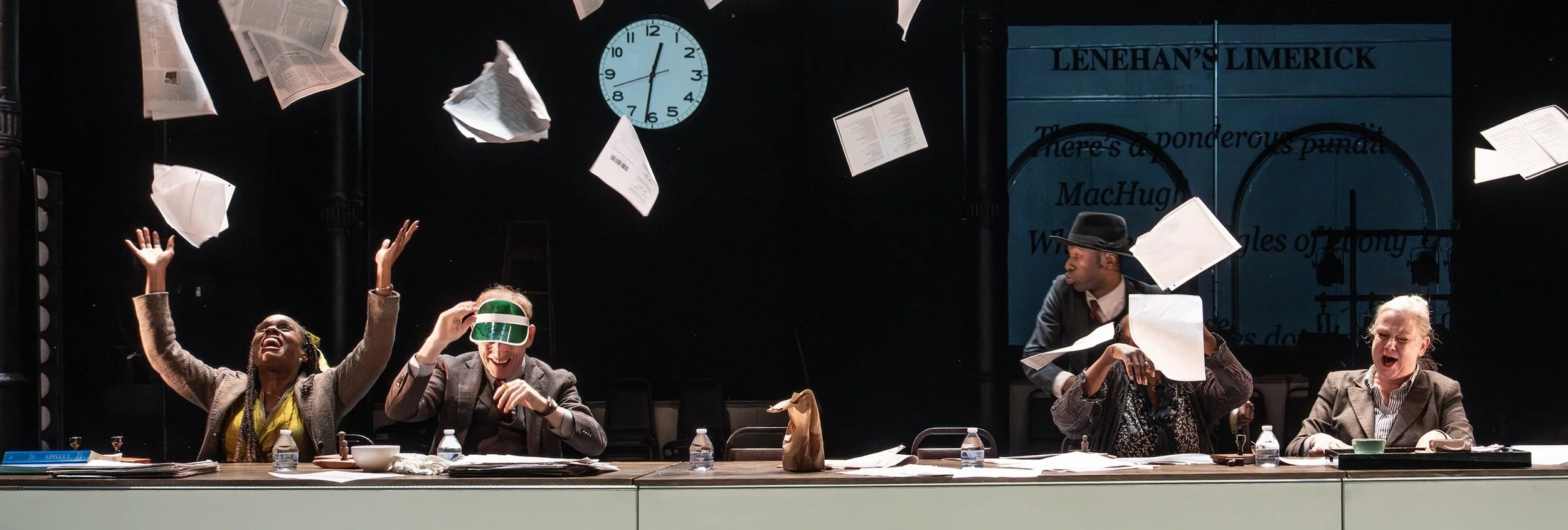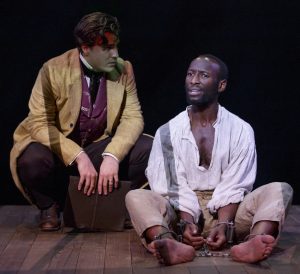Director Sam Gold, still draped in laurels from the Broadway premiere of A Doll’s House, Part 2, is exorcising demons of cliché and supposition from Shakespeare’s most frequently staged tragedy. Gold’s Juilliard contemporary Oscar Isaac stars in this reimagined Hamlet, a revenge tragedy that is arguably the greatest drama in the language.
Life Is for Living
He was a jack of all trades artistic and master of them all. Trendsetter and admired cultural icon, Noel Coward was a British actor, playwright, dancer, composer and lyricist of songs, musicals and operettas, screenwriter and director, painter, novelist, and diarist, whose style, rapier wit, and intellect dominated the worlds of British theater and entertainment throughout the 1930’s, ’40s, and ’50s. Coward is the larger-than-life subject of Simon Green and David Shrubsole’s intimate evening Life Is for Living: Conversations with Coward at 59E59 Theaters. The presentation, the newest in a series of this British team’s collaborations devoted to Coward, uses Coward’s songs with excerpts from his diaries, verse, and letters, to offer us a glimpse into the breadth, artistry, life, and wit of the Master.
Othello
Star wattage backed up by first-rate acting gives Sam Gold’s production of Othello a must-see status. Indeed, one suspects that without the celebrity power, Shakespeare’s rarely staged tragedy might have taken even longer to reappear on the boards. (John Douglas Thompson gave a superb interpretation in a traditional production back in 2009, although there is currently a rap version, Othello: The Remix, playing in midtown.)
Rancho Viejo
Dan LeFranc’s Rancho Viejo, like his excellent 2012 play The Big Meal, echoes with cosmic significance. The Big Meal was life itself; in Rancho Viejo the subject is more difficult to discern, but it seems to be the way assimilation into a society comes about and the obstacles therein. The title is the name of a residential community that exists in Dane Laffrey’s set as one beige, minimalist, Southern California living room, with floor-length windows upstage looking onto a garden path, no matter which of several homes the action cycles through. The viejo—Spanish for “old”—applies to all but one of the characters, who are firmly in middle age.
This Day Forward
This Day Forward continues playwright Nicky Silver’s meditation on parent-child relationships that he made a success of with The Lyons. His caustic new play focuses on the damage that parents can inflict on children—it’s a broad canvas of emotional (and sometimes physical) abuse, distilled into two acts set a generation apart.
Sweet Charity
The musical Sweet Charity has good bloodlines—book by Neil Simon, music by Cy Coleman, lyrics by Dorothy Fields, original direction and choreography by Bob Fosse—yet the 1966 show has never occupied the top tier of musicals, such as My Fair Lady, South Pacific, Fiddler on the Roof or Gypsy. It has hardly languished in obscurity—there was a decent Broadway revival in 2005—but the New Group production directed by Leigh Silverman is such a persuasive delight that you may come away thinking it is top-tier after all. The production benefits from a terrific performance by Sutton Foster, a two-time Tony winner (and star of TV Land channel’s popular series Younger) in the title role. Foster is better known for big-budget Broadway shows such as Thoroughly Modern Millie and Anything Goes, but it’s a thrill to see her work magic in close quarters.
My Name Is Gideon: I’m Probably Going to Die, Eventually
Every now and then a theatrical experience comes around that breaks the mold. It’s no simple task to categorize Gideon Irving’s performance piece running at the Rattlestick Playwrights Theater. Part musical, part stand-up comedy, (very small) part magic act, and part intriguing night in a complete stranger’s living room, My Name Is Gideon: I’m Probably Going to Die, Eventually is far from a one-trick pony. On the contrary, the hour-and-45-minute show is constantly surprising audience members with laughs, gasps, songs and even snacks!
Poison
Dutch playwright Lot Vekemans’ Poison, directed by Erwin Maas for Origin Theatre Company, delicately tells a story of loss, pain and grief with an unspoken complexity. This gnawing two-person play, elegantly translated in to English by Rina Vergaano, unfolds in a nondescript white room with an equally nondescript vending machine, a perfect room for waiting. As the audience arrives, actor Michael Laurence, who plays a character known only as He, is found doing just that—waiting. He is checking his phone, pacing, drawing intrigue by the slightest shake of his foot. Laurence conveys the growing stress on He’s nerves, until the light goes down and the play begins. Soon after, his character is joined by an anxious Birgit Huppuch as She, and the intricate layers of their relationship begin to reveal themselves. After having been separated, without speaking, for nine years, the couple has been brought together to discuss what is to be done about the groundwater poisoning that is seeping into the grave of their deceased young son.
Ardor
Ardor, the fourth play by playwright and director Matthew Gasda, reflects an impressive literary talent. Gasda has given the actors in his new ensemble drama material that is raw, fresh, honest, poetic, deep, daring and, clearly, a joy to perform. Their conversations are at once innocent and knowing, as well as both painfully cutting and a pleasure to hear.
Sagittarius Ponderosa
MJ Kaufman’s latest play, Sagittarius Ponderosa, tells the story of a young man returning home to help take care of his ailing father. The play, staged by the National Asian American Theatre Company (NAATCO), begins at a Thanksgiving dinner with the young man, his father and mother, and his grandmother expressing what each is grateful for. This opening scene is telling. On one hand, it’s a precursor to many familiar stories: a young person returning home attempting to make his way in the world, and his struggle with sexuality, love, and attachment; a child taking care of an elderly parent; a wife coming to terms with the eventual death of her husband; a grandmother’s struggle with hearing issues, and, more important, her desire to see her grandchild married. Even though Kaufman sets Sagittarius Ponderosa squarely within an Asian-American family, each of these stories is universal.
The Resistible Rise of Arturo Ui
It’s a turning point in American history when a candidate for President suggests, ominously, that should the election not go his way, he will not go quietly into the good night of a peaceful transition of power. Bertolt Brecht’s sprawling farce The Resistible Rise of Arturo Ui is a piercing look at the rise of a thug and petty tyrant whose lessons will not be lost on viewers in this election season. Written in a mere three weeks in 1941, the play is Brecht’s effort to radically deflate the mystique, worship, and awe that despots typically inspire. Joseph Goebbels, the Nazi Minister of Propaganda, viewed his creation of the myth of the Führer as his greatest achievement, an achievement that made possible Adolf Hitler’s consolidation of power even as he was curtailing civil liberties and murdering real and perceived threats to his power. Brecht’s weapon of choice: humor!
Coriolanus
The playbill for the Red Bull production of Shakespeare’s rarely staged Coriolanus gives the time period as "Rome, 493 B.C.E. Here, now." But, under Michael Sexton’s direction, the latter prevails: military men in camouflage fatigues and dress greens, a First Citizen with a T-shirt that reads “You can’t have capitalism without racism,” and several female soldiers all declare it’s now. There’s virtually nothing identifiable from 493 B.C.E.
Addictions of the City
The characters are lively, the language is crisp and urban, and the acting is skilled in Stephen Adly Guirgis's The Motherf**ker with the Hat. The energy of classic salsa music in the house helps pump up the energy at T. Schreiber Theatre’s exciting production. Guirgis’s unabashedly vulgar play explores themes of love, morality and choice in one of the most diverse cities in the world, New York. His characters, although primarily of Puerto Rican extraction, encompass the multiple ethnicities of the city. Most are plagued with addictions and afflictions that raises the stakes of their every move. The play, one of Guirgis’s best, is both hilarious and thought-provoking.
It starts with a high energy-conversation. Veronica (Viviana Valeria) is on the phone with her mother, who has an addiction to alcohol; Veronica dislikes her mother’s fish-faced boyfriend and tells her, “You’re dating a “fuckin’ big-time loser with a head like a actual fuckin’ fish! …Ma, when you see him tonight: Take a moment. Take a breath. Take a real good look and just ax yourself in all honesty—‘Do I wanna fuck him—or fry him up with a little adobo and paprika...?’”
Wrapped around the jokes and comic dialogue lies the issue of coping, or rather, surviving. Guirgis’s characters are struggling with heavy substance abuse and making it one day at a time. Each day is a journey for them. They include Jackie (Omar Bustamante) who enters with flowers in his hands and greets Veronica with enthusiasm and love. He chants a rhythmic “These flowers are for my Beautiful Boriqua Taino Mamacita Love Me Long Time Princess fuckin’ Beauty Queen.” Having just landed a job, Jackie wants to celebrate. He begins talking about their future, possible promotions—their life together. Still, Veronica is having trouble getting clean..
While Veronica takes a shower, Jackie finds a hat—a hat he knows does not belong to him. He smells the bed and pillows. He then asks Veronica, “Why the bed smell like Aqua Velva and dick?” But Veronica denies any infidelity and tries to calm him down by suggesting they go eat some pie. (That’s right, pie.) He reluctantly agrees.
Ralph D (Casey Braxton) is another one of the conflicted characters in the play. As a sponsor, he is guiding Jackie on the path to sobriety. Yet he is also the cause of Jackie’s fall. Ralph D has had an affair with Veronica while Jackie was in jail. Although Ralph D cares about Jackie, he has completely betrayed him. Ralph D has stayed “clean” from his additions, but he is not "clean" morally or ethically. Victoria (Jill Bianchini) and Jackie try as well, but inevitably fall off the wagon.
Among the charismatic, enigmatic characters is also Cousin Julio (Bobby Ramos). Julio helps Jackie hide a gun that he has used to threaten the man he thought was the owner of the hat. “Leave the gun. Take the empanadas,” he advises, in one of many comic lines. Julio is a delicious dichotomy of a character. Humorous and deep, he values family and is brutally honest, and Ramos’s performance is a crowd-pleaser.
Director Peter Jensen keeps the production’s energy high, and scenic designer Miguel Urbino uses sets that are minimal yet functional. They resemble an urban setting that captures the lives of these characters. Sound designer Andy Evan Cohen provides a taste of the urban Latino scene in New York City with salsa and hip-hop playing between scenes and during intermission—including “So Fresh and So Clean” by Outkast and classics by Hector Lavoe.
The Motherf**er with the Hat is a production you won't want to miss.
The Motherf**er with the Hat plays through Nov. 19 at T. Schreiber Theatre (151 W. 26th St.) Evening performances are at 8 p.m. Wednesday through Saturday; matinees are at 2 p.m. Nov. 9 and 16. Tickets are $20 for general admission; $30 for reserved seating; $40 for dinner plus VIP reserved seating. For more information, call (212) 352-3101 or visit tschreiber.org. The production contains graphic language.
Template for an Epidemic
The adventurous Playhouse Creatures Theatre Company is offering what’s labeled a “20th anniversary production” of Naomi Wallace’s One Flea Spare. This mordant historical drama didn't actually arrive in New York until 1997. It was a critical favorite at the 1996 Humana Festival of New American Plays in the playwright's hometown, Louisville, Ky.; and word of mouth from the Festival made its subsequent engagement at the Joseph Papp Public Theater one of the most anticipated events of the theater season. One Flea Spare, which derives its title from a poem by John Donne, is set in 1665 and portrays four people—a married couple and two strangers—trapped in a house that’s under quarantine. The place is the London of Daniel Defoe’s AJournal of the Plague Year, a work of fiction, which, Wallace has said, inspired the imaginative universe of her play. The current revival, directed by Caitlin McLeod and performed by a fine quintet of actors, is two relentless hours of powerful, if markedly cerebral, dialogue, with a number of narrative surprises for the first-time viewer.
Wallace wrote One Flea Spare in the midst of the AIDS epidemic, a public-health crisis that profoundly affected the American and British theater communities (and continues to do so). At that point, those infected with HIV had little expectation of longevity and those living with AIDS were subject to prejudice and a myriad of injustices. Defoe’s great novel and its portrait of plague-ravaged London was a natural point of historical reference for an erudite writer contemplating modern men and women contending with the spread of inexplicable disease.
In One Flea Spare, William and Darcy Snelgrave (Gordon Joseph Weiss and Concetta Tomei) are childless aristocrats whose home has been quarantined after the death of their servants from bubonic plague. Just as the Snelgraves are about to be released from forced isolation (which would allow them to flee London for the peace and presumed safety of the countryside), their premises are invaded by Bunce (Joseph W. Rodrigues), a virile, coarse-mannered sailor, and Morse (Remy Zaken), a 12-year-old servant disguised as the daughter of the upper-crust family whom she previously served. Both are seeking asylum from infection and the police.
The interlopers are a catastrophe for the Snelgraves. A municipal guard (Donte Bonner), charged with monitoring neighborhood compliance with hygiene regulations, sees them, bars the residence doors, and extends the quarantine. This means that four people from differing social strata of a rigidly hierarchical society must endure 28 days together in the closest quarters imaginable. As the play proceeds, the high-testosterone presence of Bunce unsettles the sex-starved Snelgraves and awakens unaccustomed responses in the pubescent Morse. Under stress of confinement, the characters' secrets and prejudices slip out, their yearnings boil up, and civility evaporates in the heat of compulsive drives and desires.
Scenic designer Bryce Cutler has configured the Sheen Center's black-box venue for intimate theater-in-the-round, with minimal space between actors and audience. The principal feature of his simple, handsome stage set is a tiny, raised platform on which the bulk of the action is played. Four of the five actors are crowded in that little square for much of the performance, while Bonner, playing the sole character not confined to the house, wanders around outside the square, addressing the other actors from a lower level that represents the street.
Sarafina Bush dresses the actors in drab-hued costumes that combine contemporary garments with items suggesting 17th-century style. Aaron Porter illuminates the stage in cold, wintry light. The effect of the creative team's design is a sense of unrelenting claustrophobia.
Wallace is an artist of extremes. Her characters are altruistic one minute, predatory the next. The dialogue veers precipitously from poetic to crass and profane. The effect of her prose is as often chilly as it is sensual. Her writing often soars with an operatic quality, fraught with emotion, that captures the characters’ sexual longing yet expresses the trauma created by their radical separation from the rest of the world. McLeod has staged the play with a great deal of dance-like movement that complements the musicality of Wallace’s text and depicts the play's eroticism and violence vividly but with a certain delicacy. Despite occasional lapses in dialect, the five actors handle the lyrical qualities of the playwright's lines and speeches effectively and function throughout as a balanced ensemble.
When One Flea Spare premiered at the Humana Festival, Wallace had already made a name for herself in Britain but was unfamiliar in her native land. During the past two decades, she has become well-known, at least for a playwright, in the United States. She has received a "genius grant" from the John D. and Catherine T. MacArthur Foundation (possibly the most enviable honor in the English-speaking world); and, since 2009, One Flea Spare has been the sole work by a living American author in the repertoire of the Comédie-Française, the French national theater. The current revival makes a strong case for One Flea Spare as the original, insightful work the critics judged it to be 20 years ago in Louisville and an enduring part of postmodernist drama.
Naomi Wallace’s One Flea Spare plays at the Sheen Center (18 Bleecker St.) through Nov. 13. Evening performances are at 8 p.m. Wednesday through Saturday; matinees are at 2 p.m. Saturdays and 3 p.m. Sundays. Tickets may be purchased by calling the box office at (212) 925-2812 or visiting sheencenter.org/shows/one-flea-spare/.
Is Now Really the Time?
Any time theater requires backstory and more research after the curtain drops, it dances a fine line between “Wow, that was interesting. I want to know more” (if you’re lucky) and (more often than not) “What the hell did I just see?” Little Lord is a Brooklyn-based company whose previous works have been praised as “scrappy creative brilliance” or “fearless in ... weirdness.” Now Is the Time. Now Is the Best Time. Now Is the Best Time of Your Life is its latest undertaking, and the show clearly falls in the second category—fearless and weird.

The Little Lord production team sets the tone for a fun and crazy evening with free pickles and coleslaw, offering $4 beer by folks dressed like deli workers and a Mistress of Ceremonies, straight out of Hairspray, even before the “curtain” goes up. Truth be told, the only thing that resembles a curtain is an iridescent panel of foil strips at the back of the stage. Just in time for Halloween, Now Is the Time is a perfect occasion to reimagine Washington Irving’s story of Rip Van Winkle, provided you are one of the few who remembers it! Between the Diedrich Knickerbocker character, a Rip Van Winkle character (oddly, played by a woman), six actors dressed up as freaky yard gnomes, and that Mistress of Ceremonies in a lime-green, pleated baby-doll dress (who later appears as Beelzebub), there is still never enough story to know which end is up. The six yard-gnome characters, who appear as if to taunt Knickerbocker, often repeat lines in unison from some of Knickerbocker’s books. Near the end, they return in white clothes and colorful knee-high socks, sporting black dunce caps (Karen Boyer did the wildly eccentric costumes) and carrying small, wooden children’s chairs. It is all just odd and disjointed.
The set design by Peiyi Wong resembles something out of Hoarding: Buried Alive on The Learning Channel. Stacks and stacks of books, a mountain of lawn chairs and beach balls, leftover Christmas lights, and an old library card catalog are just a few items that fill the stage. If you knew how Irving came to create the Rip Van Winkle character—who slept through the American Revolution—to somehow figure out this Rip Van Winkle awakens in the Catskills somewhere near Grossinger’s, the set might make sense. Now Is the Time has a mountain of missing information, and one more prop isn't going to help.
Director Michael Levinton, who also takes on the lead role of Knickerbocker, has a vision for Now Is the Time that never quite translates across the footlights. As Knickerbocker, he is outrageously quirky, and his delivery engaging. Written by Levinton, Laura von Holt, and Little Lord, the play tosses out interesting snippets of New York history like popcorn, but the story never develops beyond witnessing the madness of a man who dresses like a homeless King George, his nonsensical interaction with Rip Van Winkle, or his hiding from his loud, obnoxious wife who looks more like she should be singing, “Welcome to the ’60s.”
Now Is the Time features Kaaron Briscoe, David GR Brummer, Avi Glickstein, Fernando Gonzalez, Sauda Jackson, Polly Lee, Ry Szelong, and Morgan Lindsey Tachco. Each of them thoroughly embodies the characters they were given, whether they are the deli workers, freakishly odd garden gnomes, or the Children of the Corn with dunce caps. The full production includes very good sound effects by Kate Marvin, along with eerie and complex light design by Marika Kent.
If you are a devotee of Little Lord and company, Now Is the Time may be the ticket to be had. However, without more backstory and some continuity, it’s going to take a lot more than pickles and beer to clear the haze, wicked garden gnomes notwithstanding.
Now Is the Time. Now Is the Best Time. Now Is the Best Time of Your Life plays through Nov. 5 at the Abrons Arts Center (466 Grand St. at Pitt Street) on the Lower East Side. Evening performances are at 7:30 p.m. Wednesday through Saturday; matinees are at 2:30 p.m. Saturdays. Tickets are $25. For tickets and more information, visit abronsartscenter.org.
The End of Days
Adam Bock’s rueful A Life covers both the title and its aftermath. It may borrow from—or perhaps merely echo—other plays, but in 80 minutes Bock conveys the fragility of mortality and the sadness of one person’s death in a deeply affecting way. Structurally, A Life is unusual. It begins with a long monologue, as David Hyde Pierce’s Nate, a middle-aged gay man, talks about his life, his ex-boyfriends, and his interest in astrology. The monologue lasts half an hour, and it may recall the tour de force that opens Tony Kushner’s Homebody/Kabul, although this monologue dovetails more organically into what follows.
Bock’s theme is virtually identical to that of A Delicate Ship (yet the result is more powerful), the Anna Ziegler drama staged by Playwrights Realm last season at Playwrights Horizons. That took its title from W.H. Auden’s poem Musée des Beaux Arts, as the Greek figure of Icarus falls from the sky into the ocean:
“The expensive delicate ship, that must have seen Something amazing, a boy falling out of the sky, Had somewhere to get to, and sailed calmly on."
The point of Auden’s poem is Bock’s too: no matter the gravity of one person’s death, life continues in its myriad small ways, even though they pale next to the end of an existence. In the half-hour opener, Hyde Pierce is able to connect deftly to his audience with the details of Nate’s past. Obviously famous from his work on television, Hyde Pierce is a consummately skilled stage actor as well. He has a wry comic delivery, sometimes self-deprecating, sometimes bewildered, accompanied by nods of the head, hangdog eyes, pauses, repetitions and grimaces, as he relates his early life in Pawtucket, R.I.; his friendship there with a woman who got him interested in astrology; and the string of boyfriends that he has had, many of whose names rhymed: Sean, John, Ron, Johan, Jan. Every moment feels lived in and true.
Hyde Pierce’s casual yet powerful performance ensures that we come to care about Nate before his life-ending event. (Alas, it’s impossible to discuss this play without this spoiler.) Some of his friends, he says, wonder why he never paired up with Curtis (Brad Heberlee), his longtime best friend, but it’s not in the cards, Nate says. Their bond is conveyed in a lovely scene as the two friends sit on a New York City park bench and watch muscular men jog by, trading amusing expressions of admiration and frustration.
As Nate returns home, he suffers a heart attack. What follows under Anne Kauffman’s superb direction is another extraordinary bit of stagecraft. For perhaps four minutes—an eternity in stage time—nothing moves and one hears only Mikhail Fiksel’s urban soundscape outside and registers the subtle lighting by Matt Frey that indicates the passage of time.
Two scenes then pick up the thread of Bock and Auden’s theme more directly. The mortician’s office arrives to collect Nate’s body while the stricken Curtis stands by, a bit bewildered as the mortician, Jocelyn (Marinda Anderson), takes a call on her cell phone. It seems inappropriate, but it’s also true: other lives continue in all their small, messy ways even as one life ends. There are even comic moments amid the tragedy, as Jocelyn persistently mishears the phone number Curtis is trying to give her, and they go back and forth trying to get it right.
In the following scene the drama literally stops, as it does in D.H. Lawrence’s The Daughter-in-Law after the husband comes home from the mines and washes up, drawing its power from the simplicity of action. On a gurney in the funeral home, Nate’s body is prepared, as Jocelyn and her assistant comb the hair, cut the nails, and glue the lips shut—while discussing family flare-ups and inconsequential bits of botany and biology. The effect is to set in relief, amid the mundane babble, the gravity of a life lost.
Bock’s final scenes follow Nate’s funeral, Curtis’s breakdown (Heberlee’s part isn’t flashy, but he inhabits it feelingly), a speech by Nate’s sister (Lynne McCollough, who is equally good as a mousy mortician’s assistant), and a voice-over (there have been some already) from Nate. The voice-over carries the promise of something beyond. It’s a graceful and powerful ending to a simple story, brilliantly staged and presented.
Playwrights Horizons (416 West 42nd St. between Ninth and Tenth avenues) is presenting Adam Bock's A Life through Dec 4. Evening performances are at 7:30 p.m. Tuesdays through Saturdays and at 7 p.m. on Sundays. Matinees are at 2:30 p.m. Saturday and Sunday. During Thanksgiving week (Nov. 21-27), the performance schedule will be Monday, Tuesday, Friday and Saturday at 7:30 p.m., and Wednesday, Saturday and Sunday at 2:30 p.m. Tickets are $59-$99 and may be purchased by phone at (212) 279-4200 or by visiting phnyc.org.
Paris Is Yearning
Founded in 2006 by director and choreographer Austin McCormick, Company XIV has developed a signature fusion of theater, classical and modern dance, opera, drag, circus, live music, burlesque, and performance art. The title of its latest creation, Paris, is a double entendre of sorts—referring at once to the beloved City of Light as well as the legendary prince of Troy. Indeed, Paris unites Grecian gods and goddesses with Parisian flâneurs and can-can girls, resulting in an indulgent, adults-only revue of sublime talent.
Consequences of Our Actions
Can a trial change history? What happens when standards of behavior are violated and not brought to public reckoning? The Trial of an American President is a courtroom drama of a trial that will never take place, of legal arguments that will not be made, and finally, of a verdict that will also not happen, except perhaps in the court of public opinion, if the writer has his way
A Classic Comedy Conquest
Playwright Oliver Goldsmith found fame with his play She Stoops to Conquer in 1773, despite his rather unfashionable social reputation among London’s upper crust. Indeed, Goldsmith made it his life’s work to go against the grain, and She Stoops to Conquer exemplifies his disdain for Sentimental Comedy—a genre that was en vogue in the first part of the 18th century. Those saccharine works featured one-dimensional characters whose apotheosis was meant to instill what Sentimental playwright Richard Steele haughtily deemed “a joy too exquisite for laughter.”

Goldsmith, on the other hand, was a champion of hearty laughter, which this play—when produced well—can stir up in droves. Compared to Sentimental characters, Goldsmith’s characters are imperfect, and therein likable. The Actors Company Theatre (TACT) is staging a slightly imperfect (and therein quite likable) production of Goldsmith’s important play, directed and adapted by Scott Alan Evans. The moments when this production shines most are when it is faithful to Goldsmith’s unique genre of “laughing comedy,” aimed to elicit belly laughs with physical ridiculousness and silly twists of plot.
She Stoops to Conquer presents a bouquet of delightful characters—two eligible ingénues, a couple of bachelors from the city, and a pair of meddling parents—all of whom are subject to the playful deceits of the puckish Tony Lumpkin (Richard Thieriot). The action takes place at Mr. and Mrs. Hardcastle’s estate in the English countryside. Their daughter Kate (Mairin Lee) and their ward, Constance Neville (Justine Salata), are excited to receive two handsome young suitors (Charles Marlow and George Hastings, played by Jeremy Beck and Tony Roach) at the estate that evening.
Tony, who also happens to be Kate’s illegitimate brother, foils the plan when he intercepts the suitors at the village pub. Wanting to free himself of his mutually undesired betrothal to Constance, Tony concocts some of his signature meddling. Bringing the suitors to the estate, Tony leads them to believe that they are staying a night at an inn—and that the elder Hardcastles are actually innkeepers. This creates room for Kate, disguised as a barmaid, to woo the painfully shy Marlow, and for her cousin Constance to pursue her true love Hastings.
Overall, the cast seems to enjoy themselves in this genre. Thieriot as Tony absolutely sparkles with his mix of conniving wit and lowbrow buffoonery. As his bumbling parents, Cynthia Darlow and John Rothman are adorably befuddled by their son’s antics. Things really get good after intermission, in which Tony sends his enraged mother and Constance on a 40-mile carriage ride to nowhere, and Mr. Hardcastle finally snaps after being treated like the help in his own home. The two sets of young lovers deserve even more spice, however, especially in light of their comic counterparts; perhaps that could be created with more emphasis on physical humor rather than delivery of language.
One distinct aspect of this production is its intermittent puncturing of the fourth wall. Evans’s direction leans heavily on this device, employing a considerable amount of direct audience interaction and unmasking of the usual theatrical dressings. For example, there is no backdrop to hide the actors as they await their entrances. Instead, they are visibly seated in two rows of chairs on either side of the stage, which is a raised platform. Admittedly, Goldsmith's original script contains plenty of asides—monologues that characters deliver directly to the audience—but by stripping the stage bare, Evans’s adaptation carries the meta-theater several steps further. The bits of audience interaction between scenes undermine the actors’ comic choices and interrupt the flow and style of the play. All in all, however, this nontraditional choice does not sink the production, which provides both a fun night at the theater as well as an opportunity to experience one of England’s most important and beloved plays.
TACT’s She Stoops to Conquer plays at the Clurman Theatre at Theatre Row (410 West 42nd Street between Ninth and Tenth avenues) until Nov. 5. Tickets are available online here or by calling the TACT Member Hotline at (212) 560-2184 or (212) 947-8844.
Night of Reckoning
Nat Turner seems to be the historical figure of the moment. He is the subject of the controversial film The Birth of a Nation as well as Nathan Alan Davis’s new play Nat Turner in Jerusalem. Whether the two works mark a resurgence of interest in Turner—William Styron won a Pulitzer Prize back in 1967 for his novel about the slave who led a bloody rebellion, The Confessions of Nat Turner—is uncertain. Davis has a narrower focus: the last night Turner spent in jail, as he receives alternating visits from his prison guard and the chronicler of his deeds, Thomas Gray.

Working with a small canvas—only two actors, one of whom plays two roles—Davis paints a portrait of a prophet of sorts. (The Biblical overtone suggested by the title is appropriate to the play, although the Jerusalem was in Virginia, where Turner was hanged.) Davis’s protagonist is a generally mild-mannered former preacher, as the historical Turner was; he had been taught to read the Bible, but not allowed to read anything else. He became a pastor to the slaves, and a leader. During a monthlong uprising that he led beginning in August 1831, he managed to enlist other slaves to his cause, and they killed 12 men, 19 women and 24 children. Davis makes it clear that the deaths of the last were horrifying and inexcusable—one child was thrown headless into a fireplace to burn.
In spite of Davis’s early forthrightness about the horrors Turner perpetrated, the character, played with passion and philosophical nuance by Phillip James Brannon, gradually emerges as something of an Old Testament prophet of vengeance, imbued with a righteousness that some may find uncomfortable. It is perhaps the only way Turner’s story can be made understandable and receive any feeling akin to empathy, but it’s a subtle canonization at odds with his butchery.
There are intimations of the New Testament as well, as if Turner is also Christ-like. His chronicler Thomas Gray, whom Turner calls “Doubting Thomas,” refers to an episode “wherein you claim…to have spent thirty days alone in the wilderness.” The dual-edged reference is to Turner’s escaping capture for a month as much as to Christ’s 30 days in the wilderness. The Guard (Rowan Vickers plays both, but fares better as the Guard) shares bread with Turner. And echoes of Peter denying Christ arise in the Guard’s attempt to backpedal from a commitment he made to attend Turner’s hanging so the prisoner will spy a friendly face. (Davis’s notion that blacks will attend the hanging is a miscalculation, surely; given the recent slaughter of blacks in retaliation, it’s a stretch to believe they would gather at the gallows or that the white populace would permit them to assemble at such an incendiary event.)
The duologues Davis has devised between Turner and his two visitors are engaging and often eloquent. Turner declares, “It is Negro women, servants in wealthy houses who feed and nurture children like your daughter. Women whose own children may be snatched from them at any time and sent God knows where.”
Yet occasional moments ring false. Gray, considering a whale-oil lamp, says he feels “melancholy for the whales.... Sometimes I worry that there’s a limit. That one day there won’t be any whales left.” The sentiment might have been lifted from a recent Sierra Club press release on global warming. An example of Turner’s wit is also awkward. “Few men aspire to be the guards of prisoners,” he tells Gray in reporting a conversation with his guard. “It is little better than being a prisoner oneself. I said to one of the guards the other day, ‘Which one of us is on the wrong side of the bars? Which one of us is the real captive?’” It’s a sentiment that might be drawn from 1960s movies like King of Hearts or Cool Hand Luke.
Credibility aside, the production by Megan Sandberg-Zakian is deftly pared down and engaging, and Davis’s poetic language is given full weight. The only décor of the play, which is staged in traverse, is two large abstract paintings in gray and black, with hints of dull yellow and blue, and a platform that moves, scene by scene, from one side of the central stage to the other (the scenic design is by Susan Zeeman Rogers). An irritating loud-rock score (sound is by Nathan Leigh), akin to the pounding noise Neil LaBute used in The Shape of Things (2001), will drive you batty if you arrive too early—that is to say, more than 30 seconds before the play begins. At least what follows is, with whatever flaws it has, much more palatable.
Nat Turner in Jerusalem runs through Oct. 16 at the New York Theatre Workshop (79 E. 4th St.). Evening performances are at 7 p.m. Tuesday, Wednesday and Sunday; and at 8 p.m. Thursday, Friday and Saturday. Matinee performances are at 2 p.m. Saturday and Sunday. Tickets cost $69. Tickets may be purchased by calling 212-460-5475 or visiting nytw.org.




























